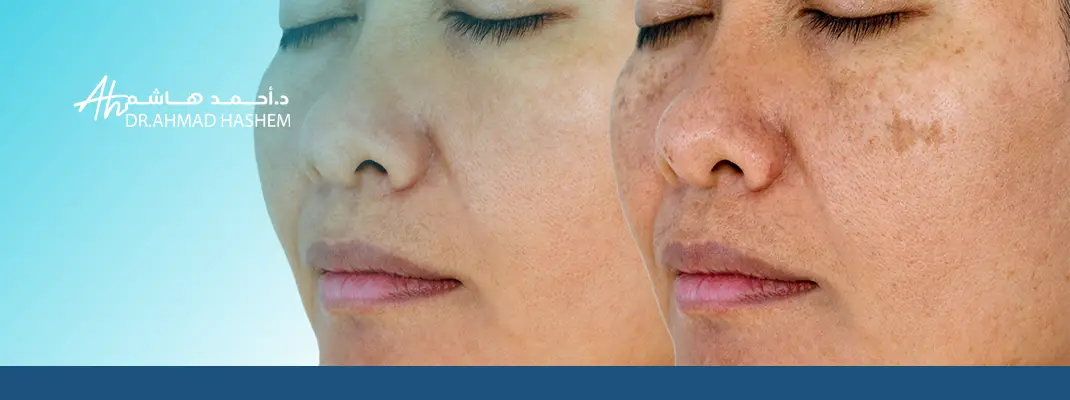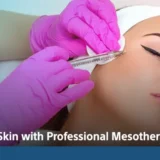Are you tired of battling skin pigmentation that just won’t fade? Whether it’s dark patches from sun exposure, hormonal changes or post-acne marks, pigmentation issues can feel impossible to manage alone
At Dr. Ahmad Hashem’s Clinic, advanced dermatological care meets personalized treatment plans to target even the most stubborn pigmentation. From deep skin pigmentation treatment to fast skin lightening options, our expert team uses safe, scientifically backed methods to give your skin a brighter, smoother future.
In this article, we’ll uncover what causes pigmentation, how to treat it effectively, and why Dr. Ahmad Hashem is the trusted name for skin pigmentation treatment in the region.
Table of Contents
What Is Skin Pigmentation?
Skin pigmentation refers to the natural color of your skin, determined by the amount and type of melanin produced by melanocyte cells. When melanin production becomes unbalanced it can lead to visible discoloration or dark patches on the skin. This uneven coloring is known as hyperpigmentation, and it’s a common concern for individuals of all skin types.

Common Causes for Skin Pigmentation
1. Genetics
With over 125 genes involved in regulating skin tone, pigmentation levels can vary dramatically from person to person. People with darker skin tones naturally produce more melanin, which offers some protection from UV damage but also makes them more prone to hyperpigmentation.
2. Sun Exposure
UV rays are among the most powerful triggers of skin pigmentation. When exposed to sunlight, your body increases melanin production to defend against UV-induced cellular damage. Over time, this leads to tanning, freckles, sunspots or melasma. The process begins with UV rays producing free radicals, which then stimulate melanocytes through the enzyme tyrosinase, converting tyrosine into visible melanin.
3. Medications
some antibiotics, hormone therapies and birth control pills may disturb the natural balance of melanin, causing either hyperpigmentation or hypopigmentation. These changes might be temporary or long-term depending on the drug and individual skin response.
4. Inflammation & Skin Injury
Any trauma or inflammation to the skin, such as acne, eczema, psoriasis or burns can result in post-inflammatory hyperpigmentation (PIH). This is especially common among people with melanin-rich skin.
Read More: Ultraformer Treatment: A Revolutionary Solution for Skin Tightening and Facial Lifting
Types of Pigmentation
| Type | Symptoms | Common Areas | Who It Affects |
|---|---|---|---|
| Age Spots | Flat brown, tan or black spots due to sun exposure | Face, hands and shoulders | Older adults or anyone with long-term sun exposure |
| Melasma | Large, symmetrical patches of darkened skin | Forehead, cheeks, upper lip and stomach | Women, especially pregnant women or those on hormonal treatments |
| Post-Inflammatory Hyperpigmentation (PIH) | Dark spots or patches following skin inflammation or trauma | Anywhere inflammation occurred | People with acne, eczema, or any injury or irritation to the skin |
Treatment Options for Skin Pigmentation
1. Face Acids
These exfoliate the skin to remove the top layer and promote the emergence of new skin cells, evening out skin tone.
Popular ingredients:
- Glycolic acid (AHA)
- Lactic acid
- Kojic acid
- Salicylic acid (BHA)
- Azelaic acid
- Vitamin C (L-ascorbic acid)
Best for: Mild hyperpigmentation on fair to dark skin tones.
2. Retinoids
Vitamin A derivatives that penetrate deep into the skin to speed up cell turnover and fade discoloration.
Available as:
- OTC products
- Prescription versions
Best for: Acne, wrinkles and hyperpigmentation but may irritate sensitive skin.
3. Chemical Peels
These use concentrated acids to remove the epidermis and reduce pigmentation.
Types:
- At-home
- In-office
Risks: Redness, irritation, blistering, especially if exposed to sun post-treatment.
Best for: Age spots, melasma, blotchy skin, and sun damage.
4. Laser Peel (Skin Resurfacing)
Uses ablative or non-ablative lasers to remove or stimulate skin layers.
- Ablative: Removes layers (more intense).
- Non-ablative: Stimulates collagen production.
Best for: Fair skin. Not ideal for darker tones due to risk of increased pigmentation.
5. IPL Therapy (Intense Pulsed Light)
A non-invasive light treatment that targets pigmentation and skin texture.
Ideal for: Flat spots, sun damage, enlarged pores.
Best for: Fair skin.
Read More:Benefits of Laser Skin Rejuvenation for Anti-Aging
Skincare Routine Tips to Reduce Pigmentation
To reduce pigmentation, follow a consistent skincare routine that includes a gentle cleanser, exfoliating acids (like glycolic or salicylic acid) and targeted serums with ingredients such as Vitamin C, niacinamide or kojic acid.
Always moisturize to support skin repair and apply broad-spectrum sunscreen daily to prevent worsening of dark spots. Introduce retinoids gradually for long-term fading of pigmentation, avoid picking at your skin and be patient.visible results can take weeks with consistent care.
Read More: Laser Treatment for Face for Better Skin Glow
How Long Does Pigmentation Treatment Take?
- Topical treatments (like Vitamin C or retinoids): 2 to 12 weeks to show visible improvement.
- Chemical peels & microneedling: Often require multiple sessions spaced weeks apart, with results appearing over 1 to 3 months.
- Laser pigmentation treatment: Most people need 3 to 6 sessions, spaced several weeks apart, with final results appearing after 2 to 6 months.
Why Dr. Ahmad Hashem’s Clinic Is the Go-To for Skin Pigmentation Treatment?
Dr. Ahmad Hashem’s Clinic stands out as a trusted destination for those seeking effective solutions to skin pigmentation problems. With years of experience in dermatology, Dr. Hashem offers precise diagnosis and expert care for various conditions such as melasma, sunspots and post-inflammatory pigmentation.
The clinic is equipped with FDA-approved laser systems and modern equipment that ensure accurate, safe and minimally invasive procedures. Each treatment is customized according to the patient’s skin type, tone and pigmentation severity. This personalized approach maximizes results while minimizing discomfort and downtime.
Patients consistently report high satisfaction thanks to the noticeable improvements in their skin tone and texture. Their trust is further reinforced by real, documented results and positive experiences shared through word-of-mouth and online reviews.
If you are looking for proven skin pigmentation Treatment that combines science, technology, and tailored medical care, Dr. Ahmed Hashem’s Clinic is the choice you can rely on.
د.أحمد هاشم
استشاري جلدية وتجميل وليزر وزراعة الشعر وطب ضد الشيخوخة، ومدرب للأطباء على البوتوكس والفيلر والشد بالخيوط








